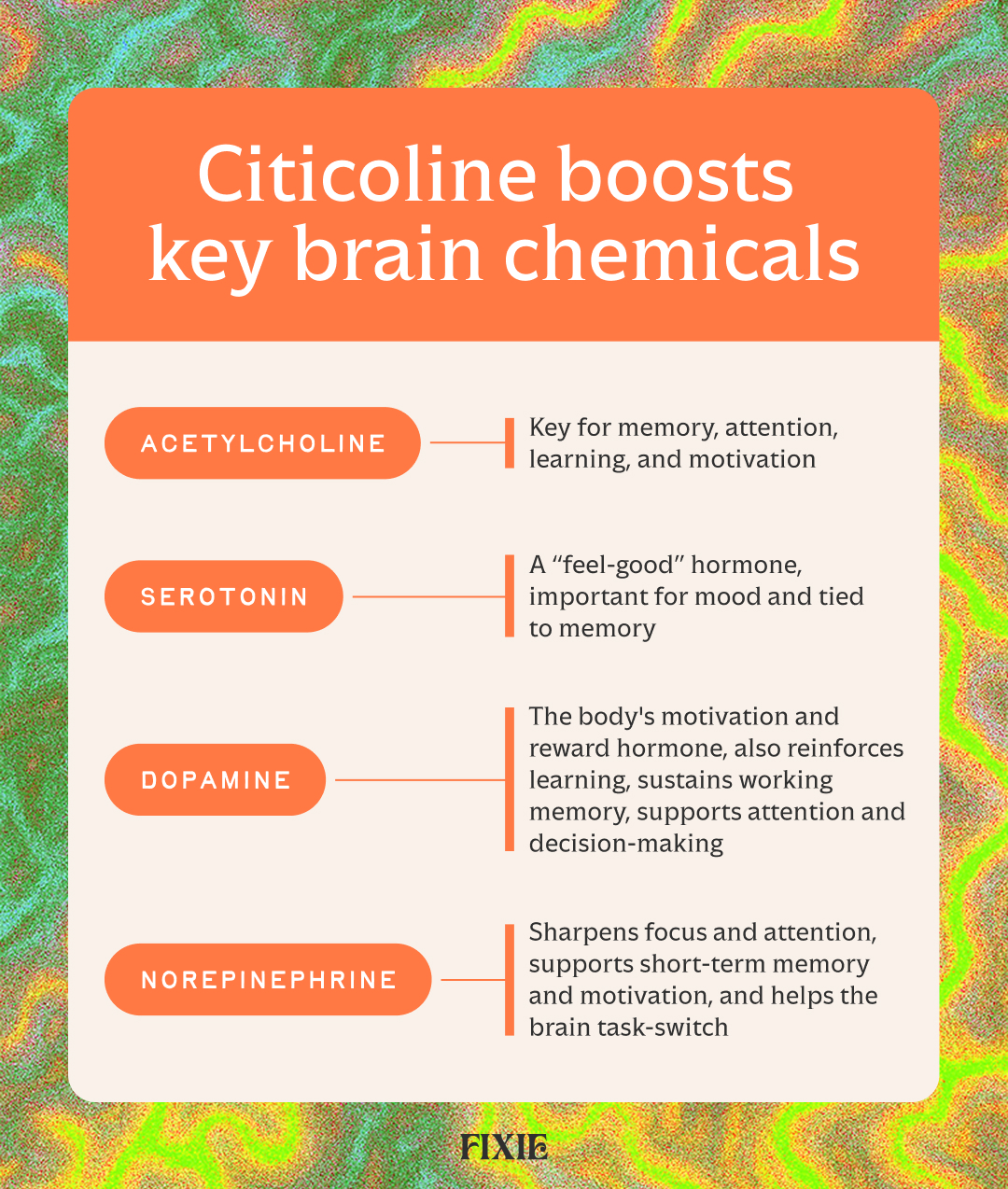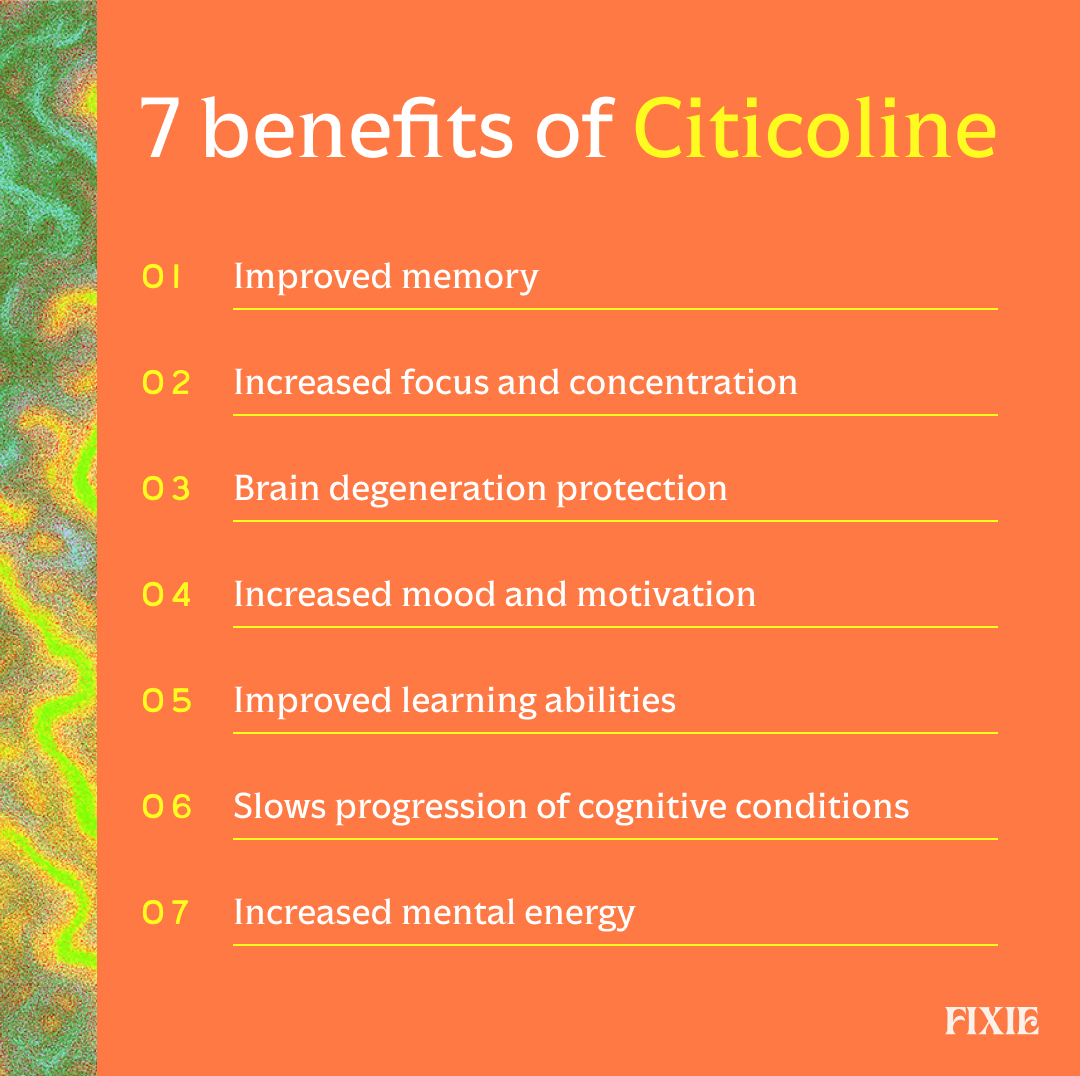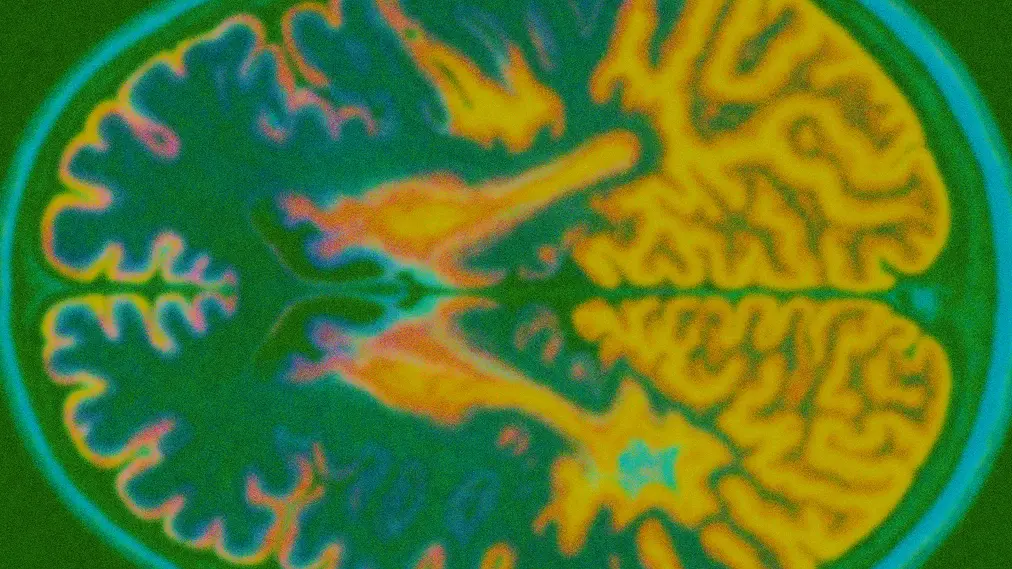Citicoline Benefits for Brain and Cognitive Function

Citicoline isn’t just hype. It’s a natural nootropic that has legit, science-backed benefits for memory, mood, focus, and overall cognitive health.
We’re going to let you in on a little secret even the most in-the-know wellness buffs may not know: citicoline is the nootropic we’ve been sleeping on. Citicoline is a substance our bodies already make naturally, it’s safe, and it improves our brain health in a variety of ways.
“Research suggests citicoline may improve memory, focus, and mental energy, particularly in people with cognitive decline, stroke recovery, or traumatic brain injury,” says registered dietitian Trista Best, MPH, RD, LD. “It may also have neuroprotective effects, reducing inflammation and oxidative stress in the brain.”
That’s an impressive list of potential citicoline benefits! So, we took a deeper dive into the science to find out more about citicoline’s uses, how it works, and how it might nourish our noggins.
What is citicoline?
You’ve heard of other nootropics like caffeine and creatine, but citicoline—AKA CDP-choline— is probably new to you. Basically, it helps your brain fire on all cylinders, without the jitters of prescription stimulants or too much coffee.
Citicoline is a naturally-occurring compound that supports brain health. It’s composed of four parts: cytosine, ribose, pyrophosphate, and choline.
One of these parts is choline (and maybe the only part that sounds familiar). Choline is crucial for brain health, but it declines as we get older. This decreased store of choline may contribute to age-related cognitive impairment, which is why some people consider supplementation. Animal-based proteins, like beef and eggs, are great natural sources of choline.
Permit me to geek out on biochemistry for a minute to explain where citicoline gets its power: when you take a citicoline (CDP-choline) supplement, it’s broken down in the gut into two parts—choline and cytidine. These get absorbed into the body, zip along individually to the brain (taking care of some important jobs along the way), and then reassemble back into citicoline when they reach the brain. This is an important step in the synthesis of phosphatidylcholine—a key component of brain cell membranes.
Phosphatidylcholine (try saying that four times fast!) produces the neurotransmitter acetylcholine. It’s crucial for the integrity and repair of neural membranes and decreases as we age, explains registered culinary dietitian Bailey Franklyn.
Citicoline supplements can be sold generically, but one brand name is Cognizin. One randomized controlled trial found it to be beneficial for memory in healthy adults aged 50 to 85. A smaller, older study showed Cognizin was more effective than a placebo for improved attention and psychomotor speed and reduced impulsivity in adolescent males.
How does citicoline work in the brain?
Citicoline is a real overachiever. First, it boosts levels of important brain chemicals acetylcholine, serotonin, norepinephrine, and dopamine. All of these are neurotransmitters: chemical messengers that send signals between nerve cells and other cells in the body. They have big roles throughout the body, but here’s how they’re tied to cognitive function:
- Acetylcholine: This one is key for memory, attention, learning, and motivation.
- Serotonin: One of the body’s “feel-good” hormones, serotonin is important for mood. Plus, it’s associated with cognitive function and larger brain volume in the hippocampus, which is tied to memory.
- Dopamine: Known as the body’s reward and motivation signal, it reinforces learning. Dopamine also filters information, sustains working memory, and supports attention and decision-making. We’re often chasing hits of this when we’re endlessly scrolling on social media or making late-night buys on Poshmark.
- Norepinephrine: It sharpens our focus and attention, supports short-term memory and motivation, and helps the brain switch from task to task more easily. With full calendars and miles-long to-do lists, the ability to do this is a necessity.

But there’s more. Citicoline also protects the brain in these ways:
- Boosts the production of phospholipids, which are essential building blocks of brain cell membranes
- Reduces oxidative stress and inflammation and increases antioxidant activity, protecting neurons from damage and supporting brain repair
- Prevents the loss of vital brain fats sphingomyelin and cardiolipin, which is found in the inner part of mitochondria (the cells’ energy centers)
- Supports neuron repair and energy regulation in brain cells
- Repairs and protects cell membranes by helping the body quickly rebuild the building-blocks called phospholipids
Long story short: citicoline supports and strengthens the physical structure of the brain by helping it repair itself and preventing damage caused by inflammation.
Citicoline uses for brain and cognitive function
Clinical research on citicoline uses is still growing. But, so far, the findings are kind of mind-blowing.
Mental clarity for healthy adults
One small study found a daily dose of 500 mg of citicoline for two weeks improved attention and focus over time (called psychomotor vigilance, which sounds way more intense than it is). It also helped overall attention and visual working memory more effectively than a placebo. In addition, citicoline reduced oxidative stress markers, indicating it has neuroprotective properties.
Citicoline’s anti-inflammatory and neuroprotective properties, as well as its ability to boost the production of acetylcholine, make it a strong candidate as a treatment for brain fog.
While you can certainly have brain fog for tons of reasons, research about brain fog and citicoline has mainly focused on people with long COVID. Citicoline may lessen the lapses in memory and concentration that are commonly associated with long COVID… but also, citicoline has anti-viral and anti-inflammation properties, making it a potential win for fighting the illness at the root of the fog.
Neurological treatment
A 2023 meta-analysis included six studies on patients with mild cognitive impairment, Alzheimer’s disease, or post-stroke dementia. All of the studies showed a positive effect of citicoline on cognitive functions.
Although the results depended on the dosage, a 2025 meta-analysis of 13 different studies highlighted citicoline’s potential neuroprotective role in acute ischemic stroke (a stroke resulting from blocked blood flow to the brain). Those taking certain doses of citicoline had higher rates of neurological improvement and reduced mortality.
Citicoline’s uses may also extend to head trauma and infections of the central nervous system—again, thanks to its ability to reduce inflammation and protect the brain.
Age-related memory loss
Our brains get less sharp the older we get (which explains why I find myself slipping on names and tasks more frequently now). Citicoline may help prevent this, or at least slow it down.
In one study, healthy adults ages 50 to 85 with age-associated memory impairment who received 250 mg of citicoline a day for 12 weeks had significant improvements to their memory as compared to study participants who received a placebo.
Citicoline supplementation was also found to slow the progress of dementia and improve daily functioning in people with dementia.
Mental health hygiene
A 2017 study found people had fewer depression symptoms when being treated with a combination of citicoline and antidepressant citalopram (brand name Celexa) than with the antidepressant alone.
Citicoline benefits
Citicoline may be just the addition your brain’s been craving to help it feel more clear, focused, and sharp. Here are just a few benefits of this super supplement:
Improved memory
Think of citicoline as brain fuel: by increasing acetylcholine and phosphatidylcholine, it sharpens both short- and long-term memory. Clinical trials back this up, showing better recall and verbal learning—not just in healthy adults, but also in older adults and people facing cognitive challenges.
Increased focus and concentration
Apparently, I have to reread an email at least twice now for the information to sink in because I often lose focus midway through. Citicoline has been shown to be good for improving focus and concentration. In one study, participants made fewer errors on cognitive tests when taking citicoline—a huge relief to those of us feeling like important details and tasks are slipping through the cracks.
Brain degeneration protection
Citicoline literally helps keep our brains intact by preserving brain volume and preventing neuron loss.
Recent research has found that citicoline protects against both white and gray matter degeneration and brain inflammation, positioning it as a potential neuroprotector across various conditions.
Increased mood and motivation
By amping up dopamine and serotonin levels, citicoline might make us feel happier and more motivated. How? Enter the body’s feel-good chemicals. Dopamine is the body’s reward, motivation, and pleasure messenger. Serotonin also uplifts our mood. Low levels of serotonin are associated with depression and anxiety.
Improved learning abilities
Taking citicoline probably isn’t going to earn you a membership in Mensa, but it may make learning easier. It boosts synaptic plasticity, the brain's ability to adapt and form new connections. And acetylcholine, which is modulated by citicoline, is an all-important learning neurotransmitter.
Slower progression of cognitive conditions
Citicoline may help slow down the clock a bit for those at risk of Alzheimer’s or vascular dementia. Using citicoline regularly may improve cognition and daily functioning in early-stage dementia.
Glaucoma protection
Citicoline may be good for the eyes, not just the brain. This makes sense, as choline has been long associated with eye health. In fact, a choline deficiency is associated with glaucoma, as well as other eye conditions.
The research isn’t conclusive and many studies have been small and done only on animals, but some suggest citicoline may slow the progression of glaucoma—the number one cause of irreversible blindness. In glaucoma, fluid builds up in the eye, and the pressure wears down cells in the eye and nerves that connect them to the brain. Some research has found taking citicoline may restore signalling between the optic nerve and the brain.
Increased mental energy
Not only can citicoline make you feel less foggy, but it could also give you a surge of brain power. That’s because citicoline increases the production of adenosine triphosphate (ATP) levels—an indicator of cellular energy—in the frontal lobe.
Citicoline’s impact on neurotransmitter action also can help people feel more sharp, as their focus, attention, and concentration feel stronger.
And because it’s not a stimulant, citicoline does all of this without the jitters, crashes, and sub-par sleep you might get with coffee or other energy products. Seriously, though: what can’t it do?

Citicoline side effects
Citicoline really offers the best of both worlds when it comes to supplements: It works and it’s safe. It’s naturally occurring in the body, and no contraindications have been identified in previous studies, Franklyn says. Citicoline has an excellent safety profile, and most studies report no serious side effects.
The only reported drug interaction citicoline has is a minor one with levodopa, which is a treatment for Parkinson disease.
Still, any supplement has a risk of side effects, even very mild ones. Start on a low dose of citicoline to allow your body time to adjust and to minimize the risk of any side effects (Fixie Dust has 250 mg of citicoline, btw).
There’s no official recommended dosage or daily allowance for citicoline like there is for vitamin C or zinc, for instance. But research has found 250 mg and up of citicoline can improve attention and memory.
If you’re pregnant or breastfeeding, it’s best to speak with your healthcare provider before taking citicoline, as the effects on these populations haven’t been studied, Franklyn says.
Some studies have been done on adolescents and children and have found no adverse effects, but check with your child’s pediatrician first.
Always speak to your healthcare provider before starting any new supplement, especially if you’re also taking other supplements or medications.
Citicoline vs. choline: What’s the difference?
Citicoline and choline supplements are often confused. The two are not the same.
Choline is an essential nutrient we absorb from food that’s good for the brain and nervous system. It’s often included in multivitamins, as well.
While both are good for brain health, citicoline (CDP-choline) has some advantages.
- Dual action: Citicoline breaks down into both choline and cytidine, giving additional support for phospholipid and neurotransmitter synthesis.
- Proven cognitive benefits: Clinical trials have found citicoline is effective for memory, attention, and neuroprotection.
Combining citicoline with other brain-boosting supplements
These other supplements may be complimentary to citicoline. No adverse interactions have been determined by taking these together, but check with your physician first if you think a nootropic supplement stack is something you’re considering.
- L-theanine enhances calm focus, reducing stress-induced cognitive impairment (and Fixie Dust has this, too).
- Phosphatidylserine boosts the activity of neurotransmitters dopamine, norepinephrine, and acetylcholine, may improve memory, and protects brain cells.
- Omega-3 fatty acids increase learning, memory, and blood flow in the brain. One of these omega-3’s, DHA, in particular, affects neurotransmitters and brain function.
- Adaptogens, such as rhodiola or ashwagandha, support stress resilience.
Citicoline in Fixie Dust
Citicoline has a slew of brain benefits, so naturally it had to be a part of the Fixie Dust ingredient list. It’s paired with other evidence-backed ingredients, including L-theanine L-tyrosine, and just a sprinkle’s worth of caffeine. The result? A natural brain-boosting, fog-lifting experience in mere minutes. It’s science, but it might just feel like magic.
The bottom line
Citicoline is a powerhouse supplement for anyone looking to boost cognitive function, support brain health, and protect against age-related decline. Fixie Dust combines citicoline with other top-tier nootropics to improve mental clarity and focus. With a growing body of scientific evidence and little to no side effects, citicoline is emerging as a smart choice for a sharper brain.
Key takeaways
- Citicoline is a well-researched, safe nootropic that supports memory, attention, and brain health.
- It works by reducing inflammation, repairing brain membranes, and boosting neurotransmitter levels.
- Studies show benefits for healthy adults, aging populations, and individuals recovering from neurological conditions.
- It has advantages over other choline sources, especially in cognitive enhancement.
- Citicoline is not a stimulant, so it can give you sharper focus without any jitters or crashes.
Frequently Asked Questions
In many studies, participants saw cognitive benefits after 12 weeks, though durations as short as two weeks have been studied. Citicoline is considered to be safe and well-tolerated. No long-term side effects have been reported.
There is not an official recommended dosage of citicoline. Most studies analyzed doses between 500 mg and 2,000 mg daily. Start on the low end to see how your body responds.
Those who are pregnant or breastfeeding should avoid citicoline. Always talk to your healthcare provider before starting any supplement.
No. It supports mental energy and focus without the stimulating effects of caffeine, energy drinks, or amphetamines.
Some studies suggest potential benefits for attention, but it is not a first-line or approved treatment for ADHD.
Yes. Citicoline increases serotonin levels, as well as other neurotransmitters: dopamine, norepinephrine, and acetylcholine.
Most users report feeling more alert, focused, and mentally sharp without the crash of traditional stimulants.
Latest Posts







.svg)


.jpg)
